Catholic Virtues
 |
 |
 |
 |
 |
 |
 |
True & False Paths to Happiness - XXVI
The Essential Role of Archetypes
There is so much insistence today on the need to be logical, rational and coherent. But what is needed for one to be logical?
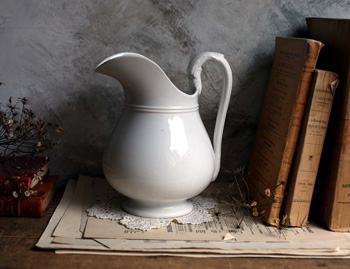 Let us imagine before us a water jar, very simple, somewhat bulky, whose shape, however, is agreeable. To be logical, we must know how to look at this jar and see the values it has. Then we should try to discern these same values first in the mineral, vegetable and animal natures, and then in men.
Let us imagine before us a water jar, very simple, somewhat bulky, whose shape, however, is agreeable. To be logical, we must know how to look at this jar and see the values it has. Then we should try to discern these same values first in the mineral, vegetable and animal natures, and then in men.
Finally, we should imagine them in the Angels. And, above the Angels, we should seek to find those qualities in God, because all true values participate in a perfection of God.
This is the path of logic, but a logic with broad horizons, without restrictive views.
The hierarchy of refinement
Imagine that I go to England and find there several fine distinguished ladies of good formation. I ask a gentleman who they are.
He responds that they are ladies of the old traditional bourgeoisie of England.
"Where did they receive the influence to become so refined?"
He replies: "It's very simple. They look to a higher social class, the nobility. The nobility is even more refined than these ladies of the bourgeoisie, who have a share of their refinement."
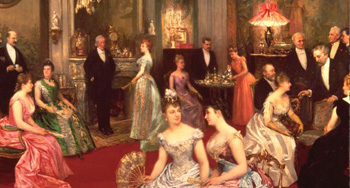
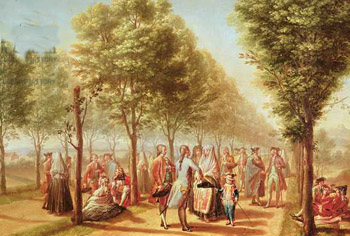 "But where would I find these ladies of the nobility?"
"But where would I find these ladies of the nobility?"
"In such-in-such a club."
"I see. Excellent! But the ladies of the nobility, from whom did they receive this refinement?"
"We have a Queen who is the prototype of refinement, who represents its very height. It flows from her – by the high position she occupies, by the magnificent education she has, by the special heredity that she possesses, by the charisma that she would have in a monarchy. Thus she exudes a special refinement that is the royal refinement.
"Now then, there are refined bourgeoisie because there are nobles; and there are nobles because there are kings. There is a person who has, in its highest degree, a certain quality that the others participate in. If such a person did not exist, this aristocratic tone would not exist in all of society." (1)
Does this explanation not make sense? Is it not reasonable and natural?
It is the quest for the perfect red, mentioned in a previous article, transposed to another plane. It can be said that the Queen is the absolute of a quality that is found in lesser and different degrees throughout the body of English society.
We find the same process in a country with a well-constituted cultural life. Seeing highly cultured men, someone will say: “This country must have excellent universities and great scholars because there cannot be so many well-formed men without there being a focal point of learning, for example, a university. And, to be able to turn out so many highly cultivated men, this institution must have at least some wise men."
That is to say, there must always be some few who are the focal point radiating qualities in which others participate.
This is how the universe is organized. All the qualities that exist in beings come from higher beings.
 Hence St Thomas affirms: If in the world any quality exists that I see, there must be, beyond the world, a Being that has this quality to an infinite degree. (3)
At the top of the archetypal pyramid is God
Hence St Thomas affirms: If in the world any quality exists that I see, there must be, beyond the world, a Being that has this quality to an infinite degree. (3)
At the top of the archetypal pyramid is God
To close with the example of the Queen would not go to the end of the question. For who gave this quality to the Queen? To stop at the Queen would be to reach the top of a truncated pyramid.
There must be another Being from whom she has received it, a Being who has not received it from anyone, who possesses it absolutely and infinitely, one who has not received anything and who gives everything to the other beings. A Being in whom all excellent things exist in a perfect and infinite way. This being is God.
The fact that there are beautiful, noble, elevated, harmonic and ordered things in the world shows that there is something much higher. It demonstrates the existence of God.
This search for archetypes makes us look for a more perfect material ambience than the one around us, which does no more than participate in some higher one. Even if we were to go to the Earthly Paradise – let us imagine this unrealizable hypothesis! – the well-formed soul would not be satisfied. For the wonders there would invite to an even greater beauty. This beauty would be precisely that of the Heavenly Paradise, which, as we know, is also a place. (4)
The Heavenly Paradise for the Earthly Paradise has a greater superiority than what the Earthly Paradise is for our Earth.
Our Lady, an archetype for the human race
This doctrine of participation, which has so many applications in the temporal world, can also be useful for the spiritual life. It is not unreasonable to establish a relationship between this doctrine and that of Holy Slavery to Our Lady, as found in the celebrated Treatise of True Devotion to the Blessed Virgin by St. Louis Maria Grignion de Montfort.
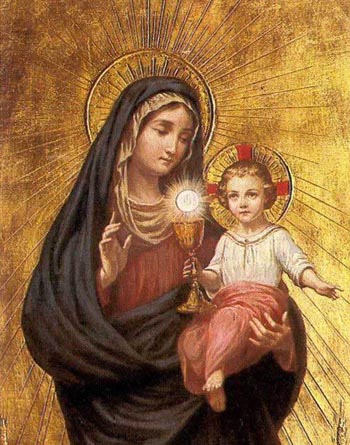 So, when we receive Our Lord in Holy Communion, we can imagine how Our Lady would adore Him. For, if we ask her to worship Our Lord for us, She will attend to our request, and in Heaven she will worship Him present in us. I can imagine at the moment of receiving Communion Our Lady in Heaven worshiping Him in my soul. But this is not just a figment of the imagination, it can be a real act, if I am her slave and ask it.
So, when we receive Our Lord in Holy Communion, we can imagine how Our Lady would adore Him. For, if we ask her to worship Our Lord for us, She will attend to our request, and in Heaven she will worship Him present in us. I can imagine at the moment of receiving Communion Our Lady in Heaven worshiping Him in my soul. But this is not just a figment of the imagination, it can be a real act, if I am her slave and ask it.
One way to do this is to consider Our Lady as the synthesis of the sanctity of all the good people who have been, are, and ever will be in this world. If we take all the good people who have been and will be on earth until the end of the world, She possesses the form of holiness that each of these people had or has. She possesses it in an unimaginable way, in an excellent way.
Each man is different from the others in something. A soul who has conquered himself is someone who gives glory to God in a way that no one else will, neither before, during or after his life. Each man is able to worship God in a way that only he can, to carry out the other primary acts of worship – thanksgiving, reparation and petition – as only he can.
Our Lady has all these ways, but in her own way. Therefore, I can make the following request to her:
"My Mother, among your countless excellencies, there is in you one that is the highest perfection of my own way of worshipping. I unite my act of worship to this ideal perfection that is in Thee. This is how I should adore thy Divine Son. Adore Him in this way for me."
It would be as if I were speaking to Him with a heavenly microphone that would make my voice charming to His ears. Even if I stuttered and was hoarse, my voice would become marvelous because it would be like the voice of Our Lady.
And so I conclude my plea: "O my Mother, speak to Him for me. I will think of Him, I will adore Him, and I ask you to do the same in your unfathomably perfect way."
And then I make my adoration of Our Lord really present in the Sacred Host.
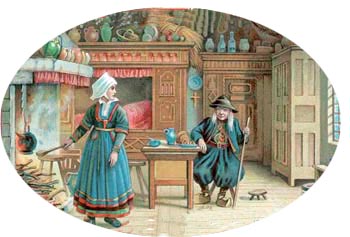
Continued


A simple pitcher can spark the quest for higher values
Finally, we should imagine them in the Angels. And, above the Angels, we should seek to find those qualities in God, because all true values participate in a perfection of God.
This is the path of logic, but a logic with broad horizons, without restrictive views.
The hierarchy of refinement
Imagine that I go to England and find there several fine distinguished ladies of good formation. I ask a gentleman who they are.
He responds that they are ladies of the old traditional bourgeoisie of England.
"Where did they receive the influence to become so refined?"
He replies: "It's very simple. They look to a higher social class, the nobility. The nobility is even more refined than these ladies of the bourgeoisie, who have a share of their refinement."

An English club with distinguished guests sets an aristocratic tone for society; below, a paseo in Spain

"In such-in-such a club."
"I see. Excellent! But the ladies of the nobility, from whom did they receive this refinement?"
"We have a Queen who is the prototype of refinement, who represents its very height. It flows from her – by the high position she occupies, by the magnificent education she has, by the special heredity that she possesses, by the charisma that she would have in a monarchy. Thus she exudes a special refinement that is the royal refinement.
"Now then, there are refined bourgeoisie because there are nobles; and there are nobles because there are kings. There is a person who has, in its highest degree, a certain quality that the others participate in. If such a person did not exist, this aristocratic tone would not exist in all of society." (1)
Does this explanation not make sense? Is it not reasonable and natural?
It is the quest for the perfect red, mentioned in a previous article, transposed to another plane. It can be said that the Queen is the absolute of a quality that is found in lesser and different degrees throughout the body of English society.
We find the same process in a country with a well-constituted cultural life. Seeing highly cultured men, someone will say: “This country must have excellent universities and great scholars because there cannot be so many well-formed men without there being a focal point of learning, for example, a university. And, to be able to turn out so many highly cultivated men, this institution must have at least some wise men."
That is to say, there must always be some few who are the focal point radiating qualities in which others participate.
This is how the universe is organized. All the qualities that exist in beings come from higher beings.

The outfit of grouse hunters on the moor reflect a high degree of refinement in society
To close with the example of the Queen would not go to the end of the question. For who gave this quality to the Queen? To stop at the Queen would be to reach the top of a truncated pyramid.
There must be another Being from whom she has received it, a Being who has not received it from anyone, who possesses it absolutely and infinitely, one who has not received anything and who gives everything to the other beings. A Being in whom all excellent things exist in a perfect and infinite way. This being is God.
The fact that there are beautiful, noble, elevated, harmonic and ordered things in the world shows that there is something much higher. It demonstrates the existence of God.
This search for archetypes makes us look for a more perfect material ambience than the one around us, which does no more than participate in some higher one. Even if we were to go to the Earthly Paradise – let us imagine this unrealizable hypothesis! – the well-formed soul would not be satisfied. For the wonders there would invite to an even greater beauty. This beauty would be precisely that of the Heavenly Paradise, which, as we know, is also a place. (4)
The Heavenly Paradise for the Earthly Paradise has a greater superiority than what the Earthly Paradise is for our Earth.
Our Lady, an archetype for the human race
This doctrine of participation, which has so many applications in the temporal world, can also be useful for the spiritual life. It is not unreasonable to establish a relationship between this doctrine and that of Holy Slavery to Our Lady, as found in the celebrated Treatise of True Devotion to the Blessed Virgin by St. Louis Maria Grignion de Montfort.

Our Lady of the Blessed Sacrament
One way to do this is to consider Our Lady as the synthesis of the sanctity of all the good people who have been, are, and ever will be in this world. If we take all the good people who have been and will be on earth until the end of the world, She possesses the form of holiness that each of these people had or has. She possesses it in an unimaginable way, in an excellent way.
Each man is different from the others in something. A soul who has conquered himself is someone who gives glory to God in a way that no one else will, neither before, during or after his life. Each man is able to worship God in a way that only he can, to carry out the other primary acts of worship – thanksgiving, reparation and petition – as only he can.
Our Lady has all these ways, but in her own way. Therefore, I can make the following request to her:
"My Mother, among your countless excellencies, there is in you one that is the highest perfection of my own way of worshipping. I unite my act of worship to this ideal perfection that is in Thee. This is how I should adore thy Divine Son. Adore Him in this way for me."
It would be as if I were speaking to Him with a heavenly microphone that would make my voice charming to His ears. Even if I stuttered and was hoarse, my voice would become marvelous because it would be like the voice of Our Lady.
And so I conclude my plea: "O my Mother, speak to Him for me. I will think of Him, I will adore Him, and I ask you to do the same in your unfathomably perfect way."
And then I make my adoration of Our Lord really present in the Sacred Host.

Peasant homes & dress take on higher tones when a society seeks excellence
Continued

- There is an allusion here to the theory of participation . St Thomas says: "For whatever is found in anything by participation must be caused in it by that to which it belongs essential, as iron becomes fiery by fire. ... Hence it follows that all beings, apart from God, do not have being of themselves, but are beings by participation. Therefore, all beings that are diversified by the diverse participation of being, so as to be more or less perfect, must necessarily be caused by one First Being, Who possesses being most perfectly." (Summa Theologiae, I, q. 44, a. 1, c.).
- See what St. Thomas says in the 1st Book of Sentences: "The first in any genre, which is very simple and very perfect, is the measure of all things that are in that genre" (D. 8 , q. 4., A. 2, ad 3).
- Imperfecta a perfectis sumunt originem (The imperfect has its origin in the perfect). Summa contra Gentiles, II, 15.
- Regarding this see St. Thomas, Summa Theologiae, I, q.70, a.2, ad 4; q.76, a.5, ad 2; q.91, a.1, ad 2, 3.
Posted March 17 2021





